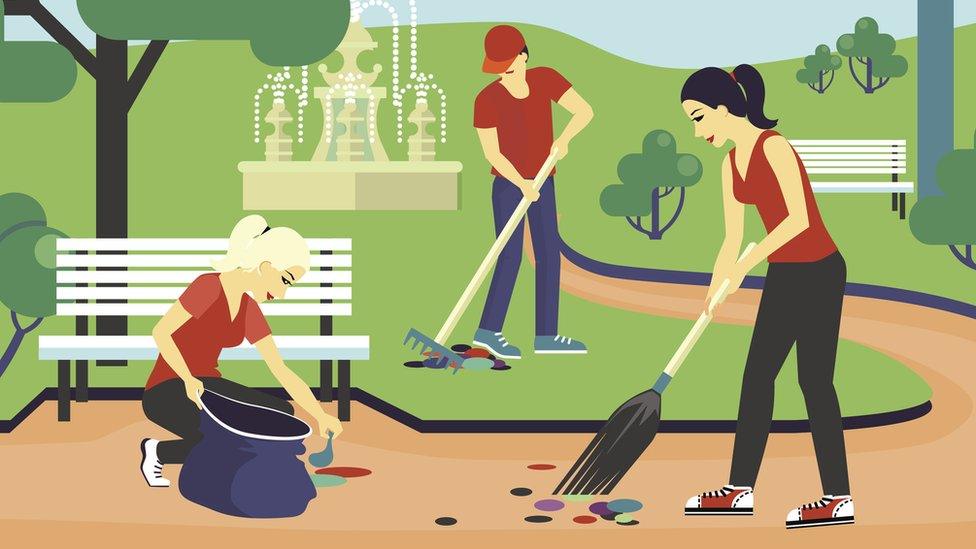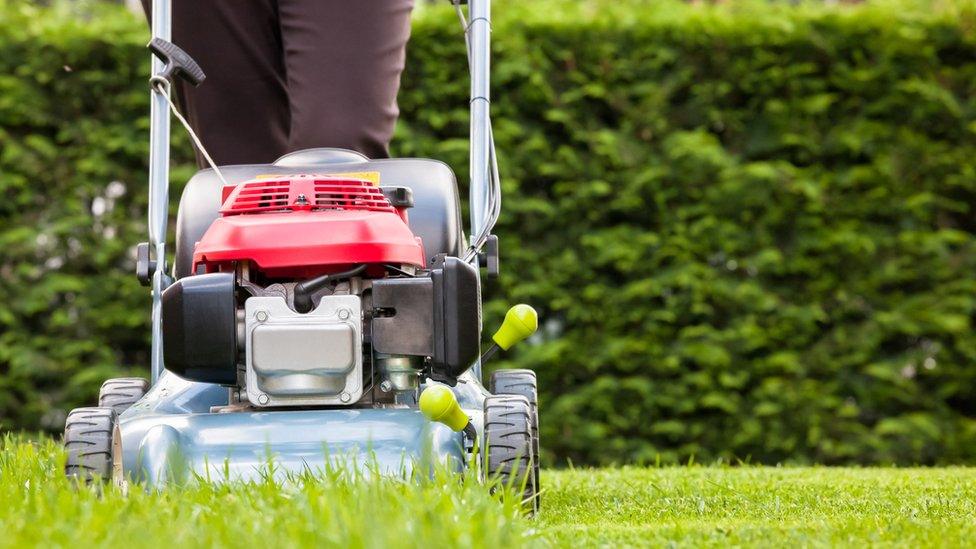Gardening and volunteering: The new wonder drugs?
- Published

Last week was national volunteers' week, a chance to celebrate the role volunteers play in society.
Their impact is immense. Some studies have put the value at over £50bn, making the voluntary sector as big as the energy industry.
But it's a two-way street. There is a growing body of research that suggests volunteering is good for your health, particularly mentally.
It can help bring stability, improve self-esteem, reduce social isolation and help people learn new skills.
For many, it can be a gateway to paid employment, which in turn has its own benefits.
In fact, there's plenty of evidence a whole range of social and practical activities can improve the wellbeing of people.
Last month, the King's Fund published a report extolling the virtues of gardening, external.
The physical benefits are pretty obvious - digging or raking a lawn for 30 minutes requires as much energy as a 2km (1.2-mile) run - and so it should come as no surprise it can help reduce the risk of heart disease, obesity and cancer.
But even gentle gardening had an impact in much less obvious ways, the report said.
It could improve balance, thus helping reduce falls in the elderly, and tackle anxiety and stress.
Simply being in a garden can be beneficial too.
In care homes, gardens have been found to be good for reducing the agitation and aggression linked to dementia, while hospices have found the tranquillity of nature can play an important part in end-of-life care.

Report author David Buck says gardens could become a "mainstream" part of health care, with a little more imagination from policymakers.
In some places, this is already happening - for gardening and much, much more.
Medical advances mean people are living longer, but many have incurable health conditions, such as dementia, heart disease and diabetes, for which they need care and support.
Two-thirds of the NHS budget is estimated to go on these patients, and this is one of the reasons why - despite increases in spending - the health service is constantly stretched.
Coupled with this are the rising demands health professionals - and GPs in particular - are reporting they face from people coming to them for non-health reasons such as personal problems and unemployment concerns.
These need to be taken seriously - left to fester, they manifest themselves in ailing mental and physical health.
A report last year by Citizen's Advice, external indicated a fifth of GPs' time was spent dealing with non-health problems - that's the equivalent of more than one consultation for everyone in the country.
The answer - some believe - is social prescribing.
This is a means of enabling doctors to refer patients with social, emotional or practical problems to a range of non-NHS services.
By working with councils and the voluntary sector, doctors up and down the country are now prescribing not just volunteering and gardening, but everything from arts groups and walking schemes to dance classes and benefits advice.

Volunteering helped me get back on track
Alex-Marie Phillips was diagnosed with schizophrenia after suffering a breakdown in October 2014. She had to stop working and studying.
But at the start of 2016, the 20-year-old began volunteering at her local Mind charity shop.
The work gave her confidence and helped her break down her "fears".
She soon started doing other things, such as visiting friends in different parts of the country.
Within months, she was in paid employment again.
"Volunteering had always been something I saw as selfless, something done purely for the benefit of others," she says.
"However, it has turned out to be so much more.
"My confidence came on in leaps and bounds.
"It has helped my social anxiety and has allowed me to get out more."

The poster boy for this push is the Bromley-by-Bow Health Centre, in east London.
Set up in the 1980s, it has grown to become a beacon of good practice highlighted by the great and the good in the NHS.
It works with about 2,000 people a month, but only a third use traditional clinical services.
Instead, cancer care involves helping people get back to work after treatment has finished as well as referring patients to hospital for tests when the disease is suspected.
The elderly are invited to take part in local arts groups to help tackle social isolation as well as being prescribed medicines for their health conditions.
And those suffering from mental health problems are encouraged to do voluntary work as well as receiving counselling and support.
When it comes to modern health care, the simple everyday activities could, it seems, play just as crucial a role as the new ground-breaking medicines.